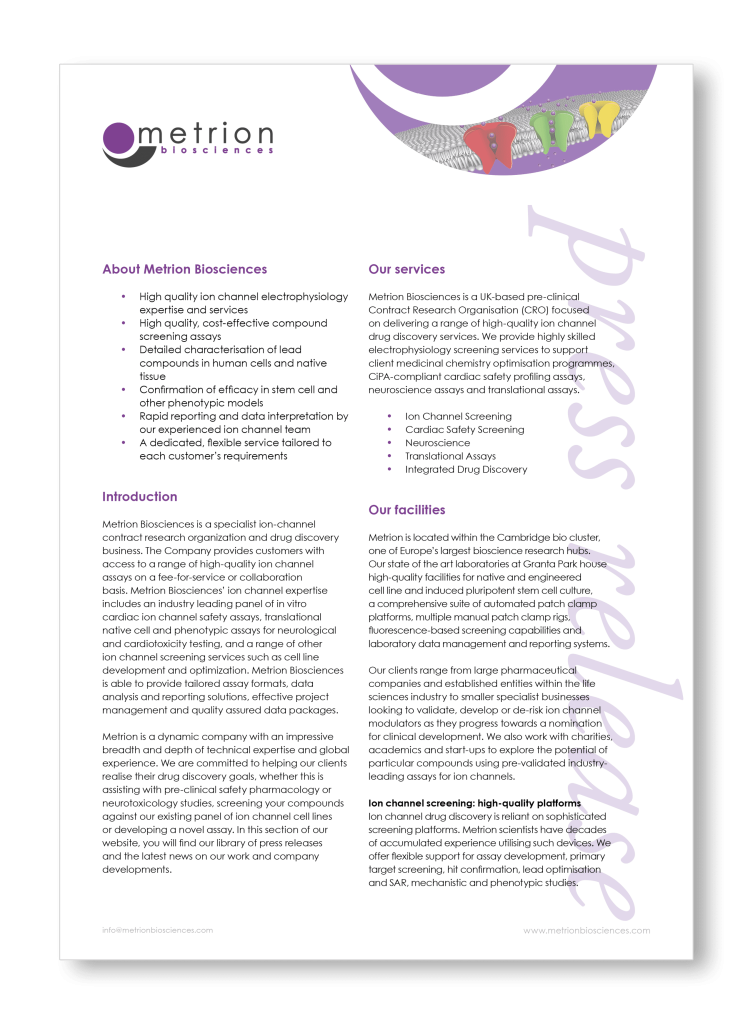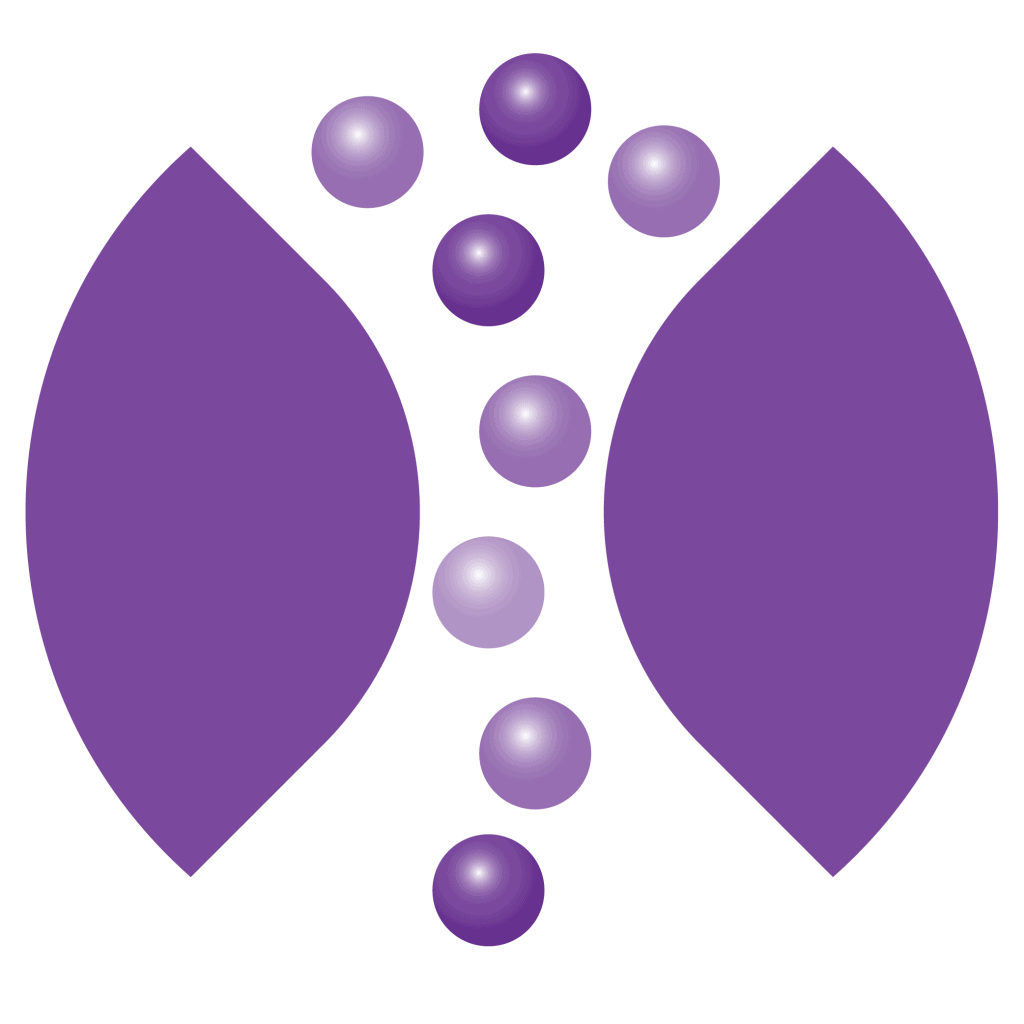Metrion Biosciences Joins CRACK IT “DRGNET” Human Pain Research Consortium

Notes to editors
Please download the full Press release to see editorial notes and Media contact information
Press Release
Metrion Biosciences Joins CRACK IT “DRGNET” Human Pain Research Consortium
Cambridge, UK, 23rd August 2016
- International Consortium will use primary human dorsal root ganglion (hDRG) neurones for identification and testing of novel pain therapeutics
Metrion Biosciences Ltd (“Metrion”), the specialist ion-channel and drug discovery CRO, has entered into an agreement with a network of partners to evaluate the use of primary human dorsal root ganglion (hDRG) neurones in pain research. This Consortium comprises the University of Glasgow (“the University”), the University of St Andrews, NHS Greater Glasgow & Clyde (“NHS-GGC”), Metrion Biosciences Ltd (“Metrion”), the Grünenthal Group (“Grünenthal”) in Germany, and the UK National Centre for the Replacement, Refinement and Reduction of Animals in Research (“NC3Rs”), with vital support and facilitation by NHS Blood & Transplant (Scotland). The ultimate aim of the project is to enhance research efficiency by putting in place a system whereby high quality and viable human DRG neurons can be supplied to both industrial and academic researchers, thereby partially superceding current methods involving isolated cells or tissues from animals, or in vivo animal testing. Successful implementation of the system will increase our understanding of the human system, facilitating drug target identification and supporting more rapid development of novel pain therapeutics.
The Consortium anticipates that the project will lead to the development of a successful human sensory neuronal model for improved mechanistic understanding and compound screening, which will aid in advancing the speed and quality of research into new pain therapeutics. Better understanding of human DRG neurons may also facilitate the development of stem cell-derived sensory neurons for use in high throughput and high content screening of new drug candidates. A successful outcome of the collaboration will also include a contribution to the reduction in the use of animals in pain research.
Metrion is supporting the project as an industrial sponsor alongside Grünenthal, a family-owned, international research-driven pharmaceutical company headquartered in Aachen, Germany. Metrion is taking over a role previously undertaken by Pfizer-Neusentis, and will be responsible for evaluation and functional characterisation of human nerve cells. The project, entitled “Developing an ethical, sustainable, human sensory neuron cell culture model for use in therapeutic pain research”, also known as DRGNET, is headed by the University of Glasgow, which has received funding from the NC3Rs as part of their CRACK IT Challenges open innovation initiative.
Supported by NHS Blood & Transplant and integrated into their pathways for life-saving organ retrieval, and only with specific authorisation from donors’ families, surgical staff from NHS-GGC will retrieve human DRGs from organ transplant donors and research staff from the University and their partners will extract viable sensory neurons. Protocol development has been approved by the West of Scotland Research Ethics Service (WoSRES). Metrion will undertake functional characterisation of sensory neurons dissociated from fresh human DRGs, in particular the distribution and function of specific ion channels and receptors.
Dr Marc Rogers, Chief Scientific Officer of Metrion, commented: “We are pleased to be asked to join the DRGNET consortium as an industrial sponsor. This opportunity recognises the extensive academic expertise of Metrion’s staff in the neuroscience field, and in particular in the application of their knowledge to develop high-quality neuronal cell assays that have helped progress several preclinical and clinical drug discovery programs. Combined with the academic and clinical credentials of the other consortium partners, we are confident of contributing to the achievement of the project goals and delivering robust in vitro assays capable of more reliable translation of therapeutic efficacy in human pain clinical trials.”
Professor Andrew Hart from the University of Glasgow and NHS Greater Glasgow & Clyde said: “We welcome Metrion’s involvement in the project, particularly given their highly relevant skillsets, exceptional technical resource, and enthusiastic collaboration that is cogniscent of the ethical sensitivities and responsibility to deliver solid therapeutic progress in pain research that is implicit in the extraordinary generosity of the transplant donors who enable this work with the support of their families.”
Dr Vicky Robinson, Chief Executive of the National Centre for the Replacement, Refinement and Reduction of Animals in Research (NC3Rs) said: “We are delighted that Metrion has joined the DRGNET CRACK IT Challenge. The expertise and experience that Metrion brings to the Challenge in validating the human DRG neurones, in addition to that already provided by Grünenthal, is critical to the success of the programme and ultimately the provision of a new resource for industry and academic scientists that allows them to reduce the use of animals in pain research and drug development.”
The intellectual property rights to the evaluation results will be owned by the University of Glasgow, and, as a sponsor, Metrion will have rights to use the data for its own research and will retain rights to any proprietary testing of compounds done within its laboratories.
“We are pleased to be asked to join the DRGNET consortium as an industrial sponsor. This opportunity recognises the extensive academic expertise of Metrion’s staff in the neuroscience field, and in particular in the application of their knowledge to develop high-quality neuronal cell assays that have helped progress several preclinical and clinical drug discovery programs.”



